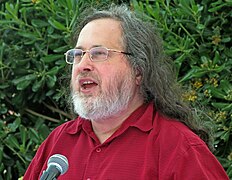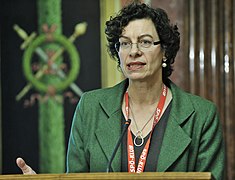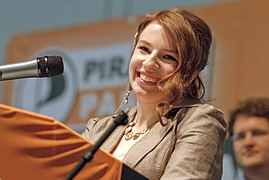Network policy
Network policy (also digital policy ) essentially describes a policy field around network culture , media policy and media law issues.
The term was originally formed as a metaphor for the developments and controversies with which the globally networked digital media technologies and their applications are inscribed in social, cultural, economic and political fields of action. In the network policy are combined since the mid- 2000s , originally from the: two schools of thought liberalism developed liberties in the form of fundamental rights and civil liberties , as well as from the Internet culture ideas created a free, open and self-determined Internet as a social and political space. As a cross-sectional matter, network policy in a broader sense includes all areas of society that are affected by digitization . Formative terms from the more recent debate are, for example, the future of work including its socio-political effects (“ Industry 4.0 ”) or the state and private monitoring of Internet use (“ Snowden Affair ”).
In Germany, following the Internet and Digital Society Enquete Commission of the German Bundestag and the digital agenda of the German Federal Government and the European Union, digital policy is increasingly being used .
Policy field
It is typical for network policy issues that they are essentially determined by the state of digital technology at a certain point in time and that the social reaction to it is largely not in the hands of the national legislature or other authorities of just one state. Network policy issues are shaped in complex processes. Many actors work together: Private and public companies, non-governmental or civil society organizations and state or supranational agencies , but also directly all citizens who use online services and platforms. Examples are the central administration of the Internet by the members of ICANN or the decision of a user to choose a more privacy-friendly provider for their own e-mail traffic.
Roughly three areas of network policy issues can be distinguished:
- Net politics (also: Internet Governance ): These are political questions about the networks themselves, their control, architecture, technical standardization. This includes organizations such as ICANN , W3C , questions of domain regulation, technical standards, global control of the technological basis of the Internet and its applications, currently e.g. B. also topics such as net neutrality , internationalization of decision-making at ICANN etc.
- Politics over the Internet : These are questions that concern the various applications in and with the Internet and their legal, political, economic and cultural standards and consequences. This includes the debates about copyrights and exploitation rights , personal rights , data protection , and the protection of minors . This also includes debates on how the newly created possibilities and media cultures change previous routines e.g. B. interrupt in the education system or in the media industry and bring about other, new opportunities, conflicts, risks, etc. Network policy here also means the public understanding of the changes that these media technologies and cultures bring to them.
- Politics with the net (also: digital democracy): These are the questions, debates, developments, how the digital media and their applications intervene in the classic political processes and institutions and change them. From eGovernment , eConsultation , eVoting to political marketing and campaigning using and in the field of digital media.
background

The politically relevant topics within the network culture include above all data protection and freedom of information as well as the promotion of free content . Instead of the criminal prosecution of copyright infringements in the case of file sharing , alternative models such as a culture flat rate are usually required within the network culture .
In 1996, John Perry Barlow , a founding member of the Electronic Frontier Foundation , published the Declaration of Independence of Cyberspace in response to the Telecommunications Act of 1996 in the USA . It is still considered to be one of the most influential fonts for a free and independent internet culture.
Via the blogosphere and media such as Twitter , network culture activists are often able to quickly organize themselves against political measures such as the blocking of websites initiated by the German government in 2009 . The power of the activist Franziska Heine introduced e-petition has to date mostly supported online petition in Germany.
Within the net-political movement, terms such as “ Stasi 2.0 ” in Germany, for example , which refers to new state surveillance technologies , or “Internet printer” as a term for politicians who decide on measures relating to net culture, but themselves have little technical and cultural understanding of them raise. In the context of the debate about internet bans, nicknames such as "Zensursula" for the family minister Ursula von der Leyen also spread .
The demonstrations that often take place under the motto “ Freedom instead of fear ” are among the major political events that also have a strong potential for mobilization within the network culture outside of the virtual space .
In 1999 and 2000, the so-called Toywar caused a sensation, in which Internet activists carried out a campaign against the toy retailer eToys , mainly via the Internet and other mass media . During the presidential election in the United States in 2000 ( Al Gore vs. GW Bush ), UBERMORGEN bought and sold votes on the ' Vote-Auction ' platform , thereby sparking a global debate on democracy and capitalism ( Bringing Capitalism and Democracy closer together , campaign slogan) and "Missing right" triggered. The Anonymous collective received worldwide attention in 2008 through the “Project Chanology”, an international protest against Scientology .
Civil society organizations and events
Germany
Supporters of political organizations such as the Chaos Computer Club , the working group on data storage or digital courage (formerly FoeBuD) feel at home in the network culture to a large extent. The blog Netzpolitik.org plays a central role as a political platform . The pirate parties see themselves as parties of the network culture. The digital society association was founded in 2010. The Society for Freedom Rights also focuses on questions of online surveillance , data protection and criminal procedure law with a view to network policy issues.
In addition, numerous other civil society organizations deal with network policy issues, due to the cross-sectional character of digitization, also those that primarily address completely different issues, for example when free teaching and learning materials are traded in education policy that are digitally created and online distributed under a free license (so-called Open Educational Resources , OER).
It was only after the Pirate Party had gained a lot of interest with its public relations work on network policy issues that working groups and related organizations were set up at the larger parties, such as D64 (SPD), Cnetz (CDU), CSUnet (CSU) or Load (FDP). .
The green politicians on the internet run the “GrünDigital” blog. On the left, there are network policy working groups at state and federal level.
In 2017, on the initiative of the State Center for Civic Education Saxony-Anhalt, it was decided to hold regular nationwide network policy days of action by the Federal Working Group on Political Education Online . The action days and their individual events were intended to bring topics related to network policy education more into the focus of the general public and to stimulate a discussion with and in civil society about how democracy can also be preserved and promoted in digital spaces. In June 2018, the first nationwide days of “Internet Policy & Democracy” took place. These were coordinated by the State Center for Civic Education Saxony-Anhalt and comprised a total of around 100 individual events. The second nationwide action days “Netzpolitik & Demokratie” were coordinated by the State Center for Political Education Baden-Württemberg and took place from November 14th to 16th.
Austria
Several network political organizations are active in Austria. This includes, for example, the registration of the Chaos Computer Club , namely the Chaos Computer Club Vienna and the Chaostreff Salzburg. The basic rights organization epicenter.works is particularly committed to European policy issues such as net neutrality . On the first Thursday of each month, representatives of civil society organizations have been organizing the Internet Politics Evening since December 3, 2015. As data protection is especially Max Schrems emerged that with NOYB own non-governmental organization founded and in particular against data breaches by large Internet platforms going.
Switzerland
The digital society has existed in Switzerland since 2011 as a non-profit organization that deals with digital rights. It is independent of the association of the same name that is active in Germany.
Others
Many of the network political organizations in Europe inside and outside the European Union are members of the umbrella organization EDRi . In France there is the NGO La Quadrature du Net .
A well-known network political organization in the USA is the Electronic Frontier Foundation (EFF) , to which well-known personalities such as the cryptologist and IT security consultant Bruce Schneier belong.
Well-known representatives of network policy positions
Well-known network activists include the founder of the GNU project Richard Stallman , the whistleblower Edward Snowden , in Germany the civil rights activist Bettina Winsemann , the bloggers Markus Beckedahl and Andre Meister from netzpolitik.org , the political scientist Jeanette Hofmann , the sociologist Andreas Kemper , the American media lawyer Tim Wu , the feminist net activist and politician of the Left Anke Domscheit-Berg , the former Federal Data Protection Commissioner Peter Schaar , the honorary spokesman for the Chaos Computer Club Constanze Kurz and Frank Rieger , the former political director of the Pirate Party Germany Marina Weisband , the Member of the Pirate Party in the European Parliament Julia Reda or the artists Rena Tangens and padeluun .
literature
- Markus Beckedahl , Falk Lücke: The digital society. Network politics, civil rights and the question of power. dtv, Munich 2012, ISBN 978-3-423-24925-6 .
- Hans Peter Bull : Network Policy. Freedom and legal protection on the Internet . Published by the German Institute for Trust and Security on the Internet (DIVSI). Nomos Verlag, Baden-Baden 2013. ISBN 978-3-8487-0130-8 , doi: 10.5771 / 9783845245881 .
- Andreas Busch, Yana Breindl, Tobias Jakobi: Network policy. An introductory overview . Springer VS. Wiesbaden 2019. ISBN 978-3-658-02032-3 .
- Leonhard Dobusch , Christian Forsterleitner, Manuela Hiesmair (eds.): Freedom on site. Handbook of municipal network policy. Edited new edition. Open Source Press, Munich 2011, ISBN 978-3-941841-35-2 ; also published as an e-book (PDF) under a Creative Commons license , ISBN 978-3-941841-40-6 .
- Leonhard Dobusch: Digital civil society in Germany. Status and perspectives 2014 . Free University of Berlin, 2014, doi: 10.17169 / FUDOCS_document_000000020121
- Kathrin Ganz: Feminist Net Politics: Perspectives and Fields of Action; Study on behalf of the GWI (2012) . 2013, urn : nbn: de: 0168-ssoar-59852-5 .
- Kathrin Ganz: The network movement. Subject positions in the political discourse of the digital society. Barbara Budrich Publishing House. Leverkusen 2018, ISBN 978-3-8474-2139-9 ; also doi: 10.3224 / 84742139.
- Samuel Greef: Network Policy - Is a Political Field for Digital Policy emerging? (= Small series - Digital. Politics. Compact , Volume 1). Verlag kassel university press, Kassel 2017, ISBN 978-3-7376-0316-4 ; also doi: 10.19211 / KUP9783737603171 , ISBN 978-3-7376-0317-1 .
- Lutz Hachmeister , Dieter stop (ed.): Broadcasting policy and network policy. Structural change in media policy in Germany (= Edition Medienpraxis , Volume 10). Herbert von Halem Verlag, Cologne 2013, ISBN 978-3-86962-081-7 .
- Lorena Jaume-Palasí, Julia Pohle, Matthias Spielkamp (eds.): Digitalpolitik. An introduction . Wikimedia Germany e. V. and iRights.international, with the support of ICANN, Berlin 2017 ( file: Digitalpolitik - Eine Einfuehrung.pdf ).
- Sina Kamala Kaufmann, Gerd Langguth , Tilman Mayer (eds.): Politics on the Web. Between election campaigns and Internet politics (= Young Political Science Forum , Volume 27). Bouvier Verlag, Bonn 2011, ISBN 978-3-416-03326-8 .
- Abel Reiberg: Network Policy. Genesis of a Policy Field. Nomos, Baden-Baden 2018, ISBN 978-3-8487-5357-4 .
Web links
- Network policy - at the Federal Agency for Civic Education
- Digital world - network policy issues on consumer protection at the Federation of German Consumer Organizations
- Digitization and democracy - network politics - on the information portal for political education
- NETZPOLITIK.ORG - news website on digital freedom rights and other network policy issues (see netzpolitik.org )
Individual evidence
- ↑ a b Ronja Kniep, Julia Pohle: Looking at the network politically. In: netzpolitik.org. September 8, 2019, accessed on September 8, 2019 (critical appreciation of the possible shift in emphasis associated with the two terms “network policy” and “digital policy”).
- ↑ Samuel Greef: Netzpolitik - Is a political field for digital politics emerging? kassel university press, Kassel 2017, ISBN 978-3-7376-0317-1 , p. 19th f ., doi : 10.19211 / KUP9783737603171 .
- ↑ Network policy in the Senate Chancellery. Senate Chancellery, accessed July 26, 2016 .
- ^ A Declaration of the Independence of Cyberspace by John Perry Barlow
- ^ Declaration of independence of cyberspace at Telepolis
- ↑ Berlin resident tells Ursula von der Leyen her opinion . In: Berliner Morgenpost , May 8, 2009
- ↑ How the Etoy Campaign was run . Telepolis , February 9, 2000
- ↑ Ubermorgen.com. In: vote-auction.net. Retrieved October 19, 2016 .
- ↑ CNN Transcript - Burden of Proof: Bidding for Ballots: Democracy on the Block - October 24, 2000. In: edition.cnn.com. Retrieved October 19, 2016 .
- ↑ a b Samuel Greef: Internet politics - Is there a political field for digital politics? kassel university press, Kassel 2017, ISBN 978-3-7376-0317-1 , p. 43 f ., doi : 10.19211 / KUP9783737603171 .
- ↑ GrünDigital - The green blog on network politics. Retrieved November 10, 2017 .
- ^ BAG Netzpolitik - Netzpolitik in the party Die Linke. Die Linke, accessed November 10, 2017 .
- ↑ Nationwide action days on network politics & democracy. Retrieved June 8, 2020 .
- ^ CCC Salzburg. Retrieved January 21, 2019 .
- ^ Homepage Netzpolitischer Abend (Austria) with broadcast archive. Retrieved August 24, 2019 .












